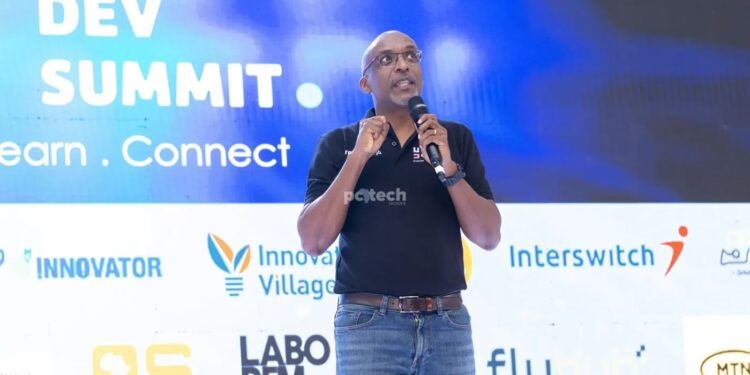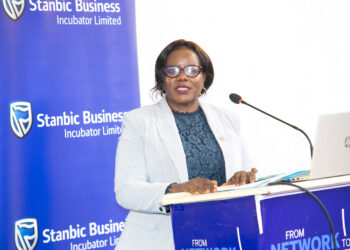The inaugural Uganda Developers Summit (UG Dev Summit) that ended on Friday left an indelible mark on the country’s tech landscape. The two-day event, which sought to revolutionize Uganda’s developer community, accelerate IT adoption, and create global opportunities for local tech talent, saw a remarkable turnout of over 500 attendees.
This diverse group included 300 developers from East Africa and beyond, as well as key stakeholders such as tech industry regulators, government MDAs, industry leaders, tertiary academic institutions, Enterprise Support Organizations, HR associations, recruitment agencies, fintech partners, and development partners.
While giving his closing remarks the Refactory’s Executive Director, Mr. Michael Niyitegeka the convener of the summit expressed his pride in the summit’s success and extended his gratitude to the partners and attendees for their enthusiastic participation.
“This UG Dev Summit couldn’t have been this without you here. And the proof that we were doing something that has value for us as individuals is in the number of people that are still seated here and listening through all the sessions,” he remarked.
Niyitegeka also revealed plans for future events, announcing that dates for the 2025 summit would be disclosed in October, with regional developer summits leading up to a grand climax in Kampala.
The second day of the summit was rich with engagements, beginning with keynote speeches from prominent industry figures. Rashmi Pillai, Group Head of Public Policy at Wave Mobile Money, and Michael Mukasa, CEO of Liquid Intelligent Technologies Uganda, shared their insights on the future of tech in Uganda. Mukasa emphasized the transformative potential of cloud computing for Ugandan organizations, highlighting opportunities for modernizing IT infrastructures, reducing costs, and boosting productivity and revenue growth.
He also stressed the importance of data protection and the digital transformation roadmap, stating, “Liquid Technologies has been at the forefront of expanding access to infrastructure and digital services, which are crucial for Uganda’s digital economy, creating new growth opportunities.”
Mukasa concluded his address by launching Uganda’s first Azure Stack, a significant step towards revolutionizing cloud connectivity and benefiting local businesses.
The summit also featured masterclasses focused on critical areas such as design engineering, API development and deployment, and leveraging shared infrastructure in the digital economy. A standout topic was leveraging digital infrastructure to serve last-mile communities through the Community Pass platform.
This innovative tool not only enhances connectivity but also acts as a catalyst for economic change, fostering trust within the financial ecosystem and bridging the gap between underserved communities and essential services. Through Community Pass, farmers can build a digital footprint, track their activities, and create a unique digital identity, facilitating access to critical services like finance and empowering their livelihoods.
Following the masterclasses, panel sessions delved into cloud technology and tech governance. James Byaruhanga, Managing Director of Roke Cloud, noted that cloud service providers in Africa are evolving to offer more than just internet connectivity, driven by both government adoption and private sector integration.
Joanita Asio Banda discussed the benefits of cloud computing, including scalability, cost savings, innovation, and security. She acknowledged stakeholder concerns about security but assured that these are addressed through features like encryption and redundancy.
Silver Kayondo, a Legal, Regulatory, and Policy strategist, spoke on the legal aspects of cloud computing. “You will not find a specific law governing cloud, AI, or other technologies because we follow the principle of technology neutrality. New technologies are emerging rapidly, and it’s impossible to legislate for each one individually,” he explained. He emphasized the importance of compliance documents, including data protection and child protection policies, to safeguard organizations.
Steven Mugabe, MD at PDPO Uganda, highlighted data sovereignty concerns in cloud computing, stressing the need for policies aligned with Uganda’s Data Protection and Privacy Act.
In the panel discussion on tech governance and policy regulation, Andrew Bukenya, Senior Manager at MTN Uganda, emphasized the transformative power of regulations in the digital age. He believes that regulations can convert traditional environments into digital spaces.
Jackie Ochola, GM and Head of Mobile at Wave Mobile Money Limited urged regulators to promote competition and protect consumers, especially as new technologies emerge. Irene Kaggwa Ssewakambo, Director of Research at UCC, pointed out Uganda’s entrepreneurial spirit and potential for ICT innovation.
“Many of our people develop apps and they’re thriving outside of Uganda. So the opportunity for us to harness our ICT apps is great and it no longer requires you to work in another country,” she said.
As the summit drew to a close, it was evident that the UG Dev Summit had successfully set the stage for future tech innovation and collaboration in Uganda. The event not only highlighted the potential of the country’s developer community but also laid the groundwork for continued growth and success in the tech sector.
Do you have a story in your community or an opinion to share with us: Email us at editorial@watchdoguganda.com













